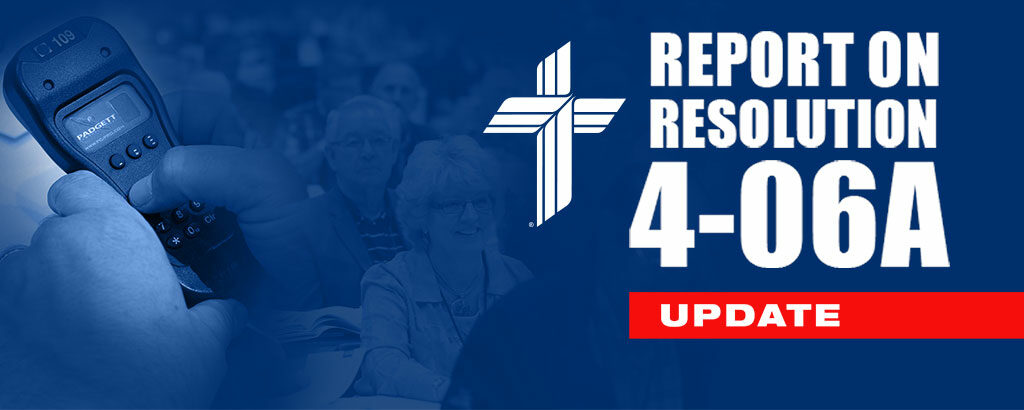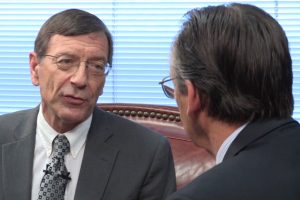
By Paula Schlueter Ross (paula.ross@lcms.org)
A new LCMS video released May 6 explains the recommendations of a task force charged with implementing Resolution 4-06A — “To Address Questions Re: Service of Licensed Lay Deacons” — adopted by delegates at the Synod’s 2013 national convention.
In the 15-minute video, titled “Licensed Lay Deacon Task Force Recommendations,” task force Chairman Rev. Larry Vogel, associate executive director of the LCMS Commission on Theology and Church Relations, acknowledges that there have been “questions and debates” within the Synod about its use of licensed lay deacons (LLDs) for more than 25 years — ever since the program was established by convention action in 1989 as a way of preparing “trained and supervised laymen to serve temporarily in Word and Sacrament ministry when no pastor is available, in exceptional circumstances or in emergencies.”

Opinions vary widely, Vogel notes — from those who believe that “the practice shouldn’t be done” at all, to those who would endorse the service of LLDs beyond temporary or exceptional circumstances.
“After surveying our district presidents and visiting the districts with the most active lay deacons programs,” says Vogel in the video, the task force published its report July 9, 2015. (Click here to see the 32-page report and two-page executive summary. Read a related Reporter Online story, “Task-force report on licensed lay deacons available.”)
“The task force worked with a strong commitment to two things: theology and mission,” he adds, and the report “provides a biblical, theological framework for how laypeople and pastors complement each other in our Lord’s mission and in the church” and proposes recommendations “to try to address the questions and to build greater harmony.”
In its recommendations, Vogel says, the task force tried “to uphold both the biblical teaching of the royal priesthood and the Bible’s teaching about the office of the public ministry” by acknowledging that:
- “every believer — man, woman and child — needs to be able to confess Christ before the world,” and
- “just as surely, when our Synod gives a particular man the responsibility to preach publicly and to administer the sacraments for a congregation, he should do so as a called pastor, and be recognized by all of us as a called pastor.”
Top among the task force’s eight recommendations is providing a special colloquy program to prepare current licensed lay deacons for ordination, which would “answer most of the theological objections” to their service, according to Vogel.
But the recommendations also endorse “fully utilizing” existing nontraditional ordination programs — such as for Specific Ministry Pastor and through the Ethnic Immigrant Institute of Theology, Center for Hispanic Studies and Cross-cultural Ministry Center — as well as identifying and training laity as non-ordained evangelists.
In addition to Vogel, the new video features perspectives from President Rev. Dr. Roger C. Paavola and two other representatives of the LCMS Mid-South District, which already is implementing some of the task force recommendations.
“This is an opportunity to affirm these [licensed lay deacons], saying ‘we recognize what you do as being the Lord’s work in this place, and we want to remove any doubt that others might have that you should be there doing that,’ ” explains the Rev. Russell L. Shewmaker, chairman of the district’s Licensed Lay Deacon Committee. “And why wouldn’t we ordain them? Because they do the work of the pastor, they should be ordained.”
The video also features comments from Deacon Bill Schutte of Mountain Home, Ark., who has served more than 13 years as a non-ordained pastor and views the task force’s recommendation that LLDs be ordained as being supportive of — and validation for — his ministry.
“I think it’s important for these people to be recognized for what they’re doing — that if they’re going to fill the office of the pastor, that they be called pastor,” Schutte says.
“This task force has given us a way forward, to place these [licensed lay deacons] fully in the office of the ministry, and to recognize them as such, with all the blessings and benefits thereof,” says LCMS President Rev. Dr. Matthew C. Harrison in the video. “We also can have enough flexibility” — such as through the Specific Ministry Pastor program and others, he notes — “to continue to serve challenging and difficult situations.”
Adds Harrison: “We want lay-training programs. We want more people, men and women, to go into lay-training programs. We will unveil and launch a huge new evangelism campaign,” he says, and will “need everybody — layperson and clergy — trained in evangelism so we can go forth and proclaim the Gospel everywhere.”
View Video
Other Resources
- Read answers to Frequently Asked Questions – Download PDF
- Visit the Resolution 4-06A Task Force page for more information
Listen to the audio version
Posted May 6, 2016





Thanks so much for posting this video. It is very helpful, and I hope all the delegates to the convention this summer watch it. I especially appreciated the Deacon’s words and his desire to serve as a Pastor to the people of his congregation.
If he, and other Deacons like him, wants to serve as a Pastor, then either he should go through the path that we went through, or we should not be required to go though that path. If they are doing pastoral duties, it should not have happened, while treating others, like the CMC graduates, as inferior.
If you’re going to ordain him, you should pay off every last dime that I, and the rest of the CMC grads, have spent to go through the process that we worked through, with no guarantee that there would be anything for us at the end.
So you’re more concerned about money than mission work? May the Lord help us.
The 2016 Convention Workbook contains fifty overtures dealing with the Licensed Lay Deacon, which were submitted by districts (18), seminaries (2), circuits (4), and one of more congregations (26). (Some districts submitted more than one overture.)
Here’s a breakdown of the positions on the LLD program taken by the fifty overtures:
Continue the LLD program – 34
Have the LLDs go through the SMP program – 8
Ordain LLDs – 2
Stop the LLD program completely – 3
Study the LLD program some more and come back with recommendations for the 2019 convention – 3
There seems to be a big push to convince us all that the Task Force recommendations are in line with the prevailing sentiment in the LCMS. If this were true, there would not be a need for the administration of Synod to spend so much time and effort to push this view. Not all Licensed Deacons want to or should be ordained but they can extend the ministry of the Pastoral office under supervision. We have the freedom in the Gospel to allow and encourage this. These are not men who are usurping the office of the ministry. They are dedicated followers of Jesus who want to support the ministry of Ordained Pastors. I side with Moses who said, “I wish that all God’s people were prophets.”
So, deacons who “function” as a Pastor want to be ordained. Well, our seminaries have openings. Apply and attend.
The deacon in the video improperly applied a Biblical passage. Is that what we are to give Christ’s lambs in the parish? Men who don’t fully understand the Scriptures teaching others the Scriptures? I believe Christ said something about both falling into a pit.
We are being urged to ordain men who want to “function” as a Pastor without making the sacrifice of leaving hometown, father and mother, taking only his wife and children, and dedicating years of study to the Bible before ordination.
The Holy Spirit warned, “Do not lay hands on anyone in haste.” I guess the LCMS is no longer concerned with giving the Church the best Pastors and theologians possible, just the most the quickest. Kyrie Eleison!
I appreciate all the work the licensed lay deacons conduct, but why “should” we ordain them? The argument that Mr. Schutte made – I perform the work of a pastor, so why shouldn’t I be ordained or called a pastor? (paraphrase) – is a flawed argument. For example, if both my wife and I died in a car accident and my brother and sister-in-law took care of my children, they would perform all the functions/work of father and mother, but they could never actually be father and mother to my children. They perform the duties of father and mother because of the extenuating circumstances. (It may not be a perfect analogy, but I think it drives home the point).
We should praise and support our licensed lay deacons and the work they do. And we also need a more complete solution that will encourage more men to go to seminary to be properly trained and called for their work as shepherds.
An even better analogy would be if my wife and I went out of town and a relative looked after our kids. They could perform certain duties/functions, but they don’t have the full legal rights of guardianship that my wife and I have. If something happened to my wife and me, someone would need to go through a formal, legal process to become a guardian/parent to the children. My relative could sign forms or perform all sorts of duties, but it has no authority unless they have gone through the formal process to become guardian.
Similar with the licensed lay deacons – their duties and functions should match their role in the church and in the circumstances that are appropriate.
Let’s not put a band-aid on the problem, let’s address the root cause of the lack of pastors and make that our focus. Support the licensed lay deacons in their appropriate work, and also support seminarians and pastors in their work.
Scripture makes clear the distinction between a deacon and a pastor/elder/overseer. Let us always come back to Scripture to guide our efforts in ensuring the sacraments are rightly administered and the Word faithfully preached.
Disappointed that this is NOT captioned. Deaf Ministries in the LCMS heavily rely on lay ministers to do the ministry. It is too bad that the deaf lay leaders do not have access to this video.
Thank you for your comment. Our Communications staff looked into this with YouTube and discovered that there are certain videos that cannot be captioned using the close-captioned feature they offer. Among the list of reasons why some videos can’t be captioned are periods of silence in the video, two people talking over one another and unfamiliar terminology or use of jargon. As it happens, this video has all of these elements. Our Communications staff is working to get this transcribed and captioned for those still wishing to view the video. Thank you for your patience.
A captioning file has now been created for the “Licensed Lay Deacon” video found at https://youtu.be/ZjtPa-RTSyU. The viewer will need to activate the “CC” button on the YouTube view screen in order to see the captions as it will not come on automatically. We hope this is helpful.
Where is the concern for souls?
Why – I had to so you must too?
When will we give more than lip service to to lost?
Where does God say there can only be one level of preacher?
Why do we graduate way fewer pastors than we need year after year?